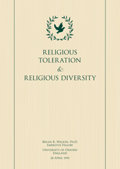The foregoing inventory is set forth in terms of relatively abstract generalization, but actual religions are historical entities, not logically constructed systems. They encompass widely different organizing principles, codes of conduct, and patterns of belief, laid down in different historical epochs, each of which, within the same broad religious tradition, was characterized by distinctive and sometimes incompatible apprehensions of religiosity. Within one religion, divergent doctrines or interpretations of ritual practice are often simultaneously acknowledged by adherents of differing degrees of sophistication. Identical items of faith or worship may be seen as symbolic by some, intrinsically powerful by others, yet both are accommodated in religious systems in which there has been not so much a replacement of one contradictory idea by another as an accretion of conceptions and interpretations over the course of history. Reconciliation of divergent ways of comprehending belief and worship may occur over time, but whether this occurs must depend on the authority and efficacy of leadership as well as on the pattern of organization. Such diversity within a given religious tradition further complicates the wider picture of differences among the major religious traditions and their innumerable sub-divisions which have developed over time. The foregoing inventory seeks to employ sufficiently broad criteria to accommodate the effects of religious evolution, accommodating the more literal, concrete, even quasi-magical elements that persist at some levels even within religious systems which have come to express and justify their beliefs and activities in sophisticated, abstract terms. Some, more recently evolved, religions may have largely or even wholly escaped the influence of the primitive conceptions which survive within others, and may, in consequence, fail to meet one or another criterion of the inventory (which necessarily includes items that are found primarily in ancient religious systems, and which have not always survived as those religions have evolved). Thus, the historical and evolutionary character of religious thought and practice implies that few if any religions will qualify equally on all items on an inventory which sets out to include indicia which take account of the variety of the species embraced by the phenomenon of religion.
XII. Religions as Historical Entities

Scientology, Social Science and the Definition of Religion
by James A. Beckford, Professor of Sociology, University of Warwick, England

Social Change and New Religious Movements
by Bryan R. Wilson,
Emeritus Fellow in Sociology, Oxford University

The Church of Scientology
by Juha Pentikäinen, Marja Pentikäinen, University of Helsinki, Finland

The Relationship Between Scientology and Other Religions
by Fumio Sawada, Eighth holder of the secrets of Yu-itsu Shinto, the oldest religion in Japan; President, Ahlul-Bait Center

The Religious Nature of Scientology
by Geoffrey Parrinder, Methodist minister, Professor, Comparative Study of Religions, University of London

Religious Philosophy, Religion and Church
by G.C. Oosthuizen, Professor of Science of Religion, University of Durban-Westville, Natal, South Africa

Scientology a New Religion
by M. Darrol Bryant, Department of Religious Studies, Renison College, University of Waterloo, Ontario, Canada

Apostates and New Religious Movements
by Bryan R. Wilson,
Emeritus Fellow in Sociology, Oxford University

Scientology: An Analysis and Comparison of its Religious Systems and Doctrines
by Bryan R. Wilson,
Emeritus Fellow in Sociology, Oxford University

The Reliability of Apostate Testimony About New Religious Movements
by Lonnie D. Kliever Ph.D., Professor of Religious Studies

The Sea Organization and its Role Within the Church of Scientology
by Frank K. Flinn Ph.D. Adjunct Professor in Religious Studies

Brief Analyses of the Religious Nature of Scientology
by J. Gordon Melton, Baylor University, Samuel Hill, Gary Bouma, Irving Hexham

Congregational Services of the Church of Scientology
by Bryan R. Wilson,
Emeritus Fellow in Sociology, Oxford University

Is Scientology A Religion?
by Alan W. Black, Associate Professor of Sociology, University of New England, Armidale, New South Wales, Australia

Is Scientology a Religion?
by Dean M. Kelley, National Council of Churches

Religious Toleration & Religious Diversity
by Bryan R. Wilson,
Emeritus Fellow in Sociology, Oxford University

Scientology A Religion In South Africa
by David Chidester, Professor of Comparative Religion, University of Cape Town, South Africa

Scientology: A True Religion
by Urbano Alonso Galan, Professor of Philosophy and Theology, Gregorian University of Rome

Scientology: A Way of Spiritual Self-Identification
by Michael Sivertsev, Moscow Academy of Sciences

Scientology: A Worshipping Community
by Lonnie D. Kliever, Southern Methodist University, Dallas, Texas

Scientology and Contemporary Definitions of Religion in the Social Sciences
by Alejandro Frigerio, Professor of Sociology, Catholic University of Argentina, Buenos Aires

Scientology and Islam an Analogous Study
by Fumio Sawada, Eighth holder of the secrets of Yu-itsu Shinto, the oldest religion in Japan; President, Ahlul-Bait Center

Scientology and Religion
by Christiaan Vonck, Rector, Faculty for Comparative Study of Religion, Antwerp, Belgium

Scientology: A Comparison with Religions of the East and West
by Per-Arne Berglie, Professor of History of Religion, University of Stockholm

Scientology Its Cosmology, Anthropology, System of Ethics and Methodologies
by Régis Dericquebourg, Professor of Sociology of Religion, University of Lille III, France

Scientology – Its Historical-Morphological Frame
by Dario Sabbatucci, Professor of History of Religions, University of Rome

Scientology: Its True Nature
by Harri Heino, Professor of Theology, University of Tampere, Finland

Scientology: The Marks of Religion
by Frank K. Flinn, Adjunct Professor of Religious Studies Washington University

